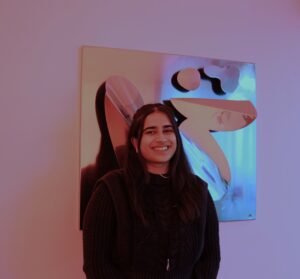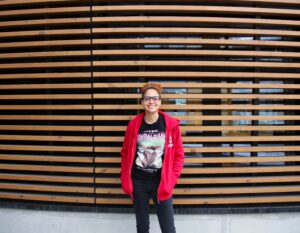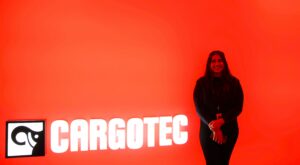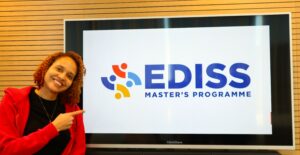12.3.2024
IT master’s programme attracts global talent and fuels Finnish tech industry
After spending their second academic year in Sweden, Italy or Spain, 84% of EDISS graduates are back and working in Finland. EDISS students gain know-how in AI, machine learning, data science and software engineering, and Finnish tech companies have been eager to hire them. Building strong connections to companies is an aim of the programme.
The international Erasmus Mundus Joint Master’s Degree Programme EDISS (Engineering Data-intensive Intelligent Software Systems) was established after being awarded a grant of 4,46 million euros from the European Education and Culture Executive Agency. Since starting in 2021, it has been a great success – recruiting top students globally who all have graduated on time. EDISS students gain know-how in AI, machine learning, and data science, and Finnish tech companies have been eager to hire them.
– This is probably the most successful programme we have, and I am tremendously impressed by our staff and students involved in EDISS, says Patrik Henelius, dean at the Faculty of Science and Engineering at Åbo Akademi University.
EDISS is the first Erasmus Mundus master’s programme to be coordinated by Åbo Akademi University. It is an exciting journey to start up a programme of this scale, that requires extensive commitment from the programme leaders and continuous communication with all partners and stakeholders, Henelius points out.
Minahil Raza was among the first students to attend the EDISS programme back in 2021. She graduated in 2023 and was quickly offered employment by Hiab as a robotics software engineer. Hiab is part of the Cargotec Corporation. Many of Raza’s co-students were also hired by Finnish companies working with software development and artificial intelligence shortly after graduating.

– When I started looking through the Erasmus catalogue, EDISS really caught my eye. The primary reason was that it had a focus on machine learning, data science and artificial intelligence. In particular, there was the specialization in intelligence systems in Spain which had really relevant subjects related to robotic perception and control, Raza explains.
When you sort of force people out of their comfort zone, you can see a lot of talent come up and everyone can see improvement and foster their interpersonal skills.
Mariama Oliveira joined the program with the third intake of students in 2023, and has a bachelor’s degree in computer science. She has also specialized in data science and data engineering. Oliveira first heard about Erasmus Mundus from a friend while Oliveira was an exchange student at Kungliga Tekniska högskolan (KTH) in Sweden. Oliveira then concluded that EDISS looked like a programme that would suit her and decided to apply.

Software and artificial intelligence
The EDISS programme is a cooperation between Åbo Akademi University, Mälardalen University (Sweden), Universitat de les Illes Balears (Spain) and Università degli Studi dell’Aquila (Italy). The purpose of the programme is to bring software engineers and data scientists together.
– A lot of things we do on a daily basis produce a lot of data, and with that data we can solve a lot of problems. We learn how to explore this data to solve problems, Oliveira explains.
Within a research-based project course, Oliveira and three other students are working with a researcher at TYKS (Turku University Hospital) who are working with premature babies, many of which suffered from apnea. The researcher in question wished to be able to detect and predict apnea in babies but did not know how to use the data available to her to accomplish it.
I think the best experiences are not related to academia but are actually more related to the people you meet here.
– We were only working with her for about four months, and she saw a lot of opportunities and new solutions she didn’t see before because she didn’t know what to do with the data, says Oliveira.
The first academic year of the programme is spent at Åbo Akademi University. During the second year the students specialize at one of the other three universities. Oliveira will spend her second year in Italy, while Raza spent her second year in Spain where she specialized in robotics.
Fulfilled expectations
One of the expectations Oliveira had when applying for EDISS was to see for herself how things work in other countries, but also to learn how she could develop her professional skills outside of her home country of Brazil. One positive aspect she points out are the resources available to students when conducting research.
– I wish everybody in the world would have the same opportunity, because it helps the research in any country to have resources, she says.
Having graduated from the programme, Raza says it really helped her improve her coding skills in languages and simulators commonly used within robotics as well as becoming better at working with artificial intelligence. She also says that EDISS exceeded her initial expectations. Aside from the practical know-how, the theory built a solid foundation necessary to understand what is happening and being discussed outside of your immediate tasks in the workplace, which provides a considerable confidence boost. Since students in EDISS came from all over the world, the programme also prepared them to work in a multicultural environment.
– When you sort of force people out of their comfort zone, you can see a lot of talent come up and everyone can see improvement and foster their interpersonal skills, she says.
Shortages drive automated solutions
As previously mentioned, Raza started working as a robotics software developer at Hiab in August 2023. One of the company’s goals is to make autonomous cargo handling a reality.
– There is a shortage of skilled workers to operate the equipment used in cargo handling, and Hiab’s goal is to bridge that gap and ultimately reach a level of automation where cargo handling is mainly a challenge handled by mobile robotic systems able to manipulate its environment, says Raza.
Her own work is mainly focused on visualization, i.e the system’s user interface. The system would make it possible for the user to supervise cargo handling under closed-loop control. The systems being developed by Hiab are such that are used in for example warehouses and ports, where the speeds are relatively low but demands for precision are high.

During her mandatory summer internship done at Nokia in 2022 Raza also worked with robots.
– Those robots were small in comparison. My task was to enable the robot to navigate in the presence of dynamic obstacles, like humans walking around, she explains.
The robots at Nokia were somewhat similar to the robots delivering groceries from stores, except they were for indoor use where it wasn’t possible to rely on GPS for positioning.
Discover new things and new people
Both Oliveira and Raza are happy with their respective experiences within the programme, but would they recommend it to others? Based on her experience within the programme and in the workplace, Raza says she would recommend it to others, but she also recommends applicants to get some work or research experience before applying. Oliveira has a similar opinion, but with a caveat.

She concedes that it is a large commitment to move to another country and do a master’s degree. So for people who are happy where they are in life, don’t see themselves doing research or maybe don’t want to move, she would recommend thinking twice before applying.
They both have fond memories from the programme. Both Oliveira and Raza are in agreement about what the best part of the programme is.
– I think the best experiences are not related to academia but are actually more related to the people you meet here, says Oliveira.
– Focus on you studies but also focus on having fun, because two years go by fast. Appreciate the time you have together with you classmates because it’s something you’re going to miss when the programme ends, she concludes.
For more information and updates on EDISS, visit the following links: